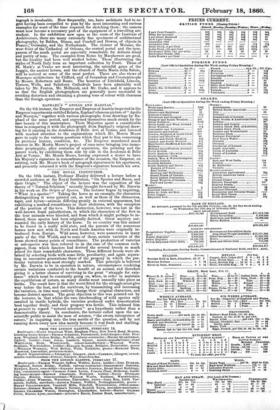THE ROYAL INSTITUTION.
On the 10th instant, Professor Huxley delivered a lecture before a crowded audience at the Royal Institution, "On Species and Races, and their Origin." The object of the lecture was the exposition of the theory of 11 Natural Selection" recently brought forward by Mr. Darwin in his work on The Origin of Species. The lecturer began by inquiring, "What is a species ? " Taking the horse as an example, the characters distinguishing it were pointed out, as well as those of the rhinoceros, tapir, and hyrax—animals differing greatly in external appearance, but exhibiting a marked resemblance in their skeletons, with the exception of the position of the toes. This distinction, however, was lost in the well-known fossil paleotherium, in which the characters of the foot in the four animals were blended, and from which it might perhaps be in- ferred, these species had been originally derived. Great mystery sur- rounded the early history of the horse. In no country was this animal to be found in a really wild state, and the parents of the numerous banes now met with in North and South America were originally in- troduced from Europe. Wild asses, however, were numerous in many parts of the Old World, and to some of these, certain varieties of the horse showed many points of resemblance. The production of varieties or sub-species was then referred to in the case of the common rock- pigeon, from which fanciers had derived the several breeds so much prized for their remarkable characters. These different breeds were ob- tained by selecting birds with some little peculiarity, and again separa- ting in successive generations those of the progeny in which the par- ticular variation was most strongly marked. This principle is believed by Mr. Darwin to be in operation in nature, circumstances rendering certain variations conducive to the benefit of an animal, and therefore giving it a better chance of surviving in the great " struggle for exis- tence" which most be constantly going on, when, in order to maintain the equilibrium of nature, as many deaths must annually take place as births. The result here is that the worst fitted for the struggle must give way before the best, and the survivors, by transmitting and increasing the variation, in time may entirely change their original characters, and become distinct species. The great objection to this was pointed out by the lecturer, in that whilst the rare interbreeding of wild species only resulted in sterile hybrids, the varieties produced under domestication bred together freely, and their progeny was fertile. This induced him at present to regard "natural selection" as a hypothesis rather than a demonstrable theory. In conclusion, the lecturer called upon the un- scientific public to assist the men of science, " the sworn interpreters of nature," in inquiring into the true merits of the question, and by not running down every new idea merely because it was fresh and startling.


























 Previous page
Previous page